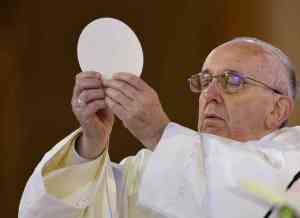We, mankind, are dependent on language to communicate meaning to one another. How else can I express what is in my mind or heart? Language works pretty well when situations are simple: “Do you want one piece of bread or two?” But a word which is man-made is only a kind of image or picture or symbol of a reality which is sometimes far more complex or mysterious than the simple artifact that we choose to represent the reality.
Take the word “love,” for example. How arbitrary these four little letters, l,o,v,e. How can they truly represent what I mean to someone who has had entirely different experiences of love? Or another example, the word “father.” When someone uses “father”, how can he/she, who had a loving, affectionate father in the home from childhood, communicate his full meaning to someone who grew up with a mostly absent father, or a cold one, one who abandoned his child at birth, or worse yet, one who abused his child?
Words and images are fraught with difficulties because they are man-made conveniences providing us with crude communication.
When we come to prayer, we experience the same problems. Words and images just aren’t adequate to carry meaning. Don’t you feel this way when you look at pictures of Jesus? No matter how beautiful, they are never good enough. Never satisfying. When I pray, I’d rather not even use the hopelessly inadequate pictures. If I pray enough, long enough, my words, no matter how devout, reverent, or loving, will fail me also. They will leave me in silence.
Yet Jesus, being truly man, used words. The whole Bible is a collection of words, and now it is the translations that worry us. Which expressions or collections of words best describe for us what God is saying? How can we know? Even the best translation by the best scholars and poets of the language will be inadequate.
But we can catch a glimpse of the meaning, and where the word fails, the Holy Spirit enters between the words to instruct and move us. Notice that St. Paul tells us that the Holy Spirit groans: “In the same way the Spirit also helps our weakness; for we do not know how to pray as we should, but the Spirit Himself intercedes for us with groanings too deep for words…” [Romans 8,26].
Only one Word is adequate to express what God intends to say to us, the incarnate Word. Jesus is literally the Word of God in the flesh. St. John of the Cross speaks in the words of the Father to us, “Fix your eyes on Him alone, for in Him I have revealed all and in Him you will find more than you could ever ask for or desire….In my Word I have already said everything.”
How do you know that you are entering contemplation? When your vocal prayers run dry and the words of your heart fail. [Your heart will not fail. Only the words of your heart.] When the longing persists. The ache. When your dogged will, ever enchanted with pursuit of the Beloved, persists. When you fall into silence and all that you have left are the groanings in your heart. When your look of love looks only into the cloud of unknowing. When you realize that what you know is so much less than what you do not know of God. When you realize that words and images are totally inadequate for communication.
Because this is contemplation: God pours Himself into the heart, mind, and will where once words and images operated. The moments of contemplation may be fleeting, but they are immensely satisfying. Here is a darkness that brings peace, not distress, a sense of love beyond measure. You would be happy to sit forever in such pregnant darkness.

